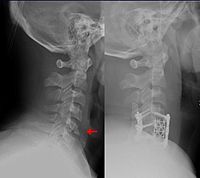
Photo from wikipedia
OBJECTIVE The influence of residency programs on teaching hospital outcomes in total joint arthroplasty (TJA) has recently been debated. This study investigates how complication and readmission rates for primary elective… Click to show full abstract
OBJECTIVE The influence of residency programs on teaching hospital outcomes in total joint arthroplasty (TJA) has recently been debated. This study investigates how complication and readmission rates for primary elective total hip (THA) and total knee arthroplasty (TKA) changed before and after new orthopedic surgery residency programs meeting ACGME accreditation requirements were introduced at hospitals. DESIGN We conducted a retrospective cohort study using the CMS Hospital Compare database, which contains hospital-level data on risk-standardized complication and readmission rates (2013-2018) for primary elective THA and TKA in Medicare beneficiaries. Orthopedic surgery residency programs that were newly accredited during this time were identified using ACGME publicly available data. SETTING Eight primary adult teaching hospitals with complication and readmission data in the CMS database available prior to the first full year its affiliated residency program was implemented, and with subsequent program data also available. PARTICIPANTS Six ACGME accredited orthopedic surgery residency programs. RESULTS Even after controlling for annual variation in surrounding hospital rates, the at-risk patient volume, and variation in starting rates for a given hospital in the first available year, multivariate linear regression demonstrated that complication rates for lower extremity TJA in Medicare beneficiaries decreased by 0.20 per year (R2 = 0.78, p = 0.005) after hospitals introduced new orthopedic surgery residency programs meeting ACGME accreditation requirements. There were no significant differences in readmission rates after the addition of newly accredited programs to these same hospitals (R2 = 0.51; p = 0.706). CONCLUSIONS Starting an orthopedic surgery residency program meeting ACGME accreditation requirements was associated with significantly reduced complication rates for primary elective lower extremity TJA in Medicare beneficiaries at teaching hospitals where these programs began rotating residents. These findings raise awareness regarding the potential for residency programs to contribute to improved patient care outside of the operating room as well as through direct resident involvement in procedures.
Journal Title: Journal of surgical education
Year Published: 2019
Link to full text (if available)
Share on Social Media: Sign Up to like & get
recommendations!